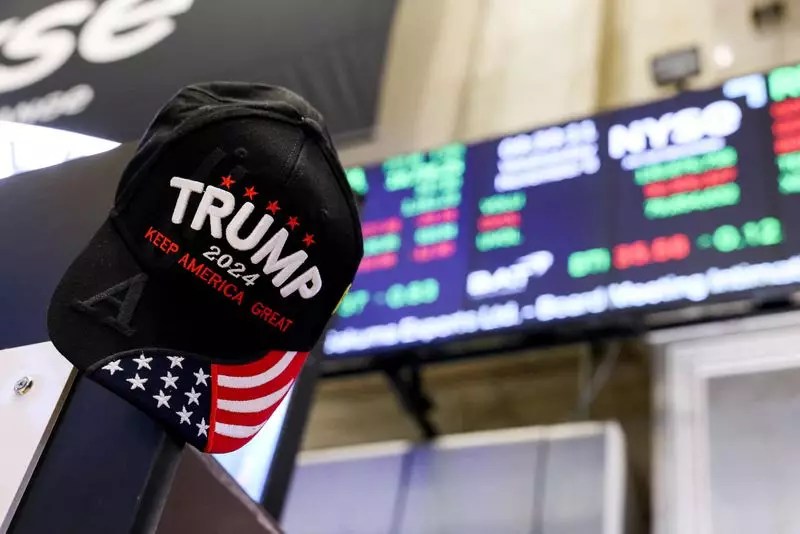As the United States transitions into a new chapter of economic leadership under President-elect Donald Trump, the selection of Scott Bessent as Treasury Secretary has stirred mixed sentiments among investors, policy analysts, and bond traders. This critical cabinet position has implications that extend far beyond the immediate treasury market, influencing economic policy, investor confidence, and global financial dynamics. Bessent, an experienced financial strategist, is stepping into an arena fraught with challenges and opportunities that will shape the trajectory of the U.S. economy.
The recent announcement of Bessent’s nomination aims to alleviate some of the prevailing uncertainty in the U.S. Treasury market. For weeks leading up to the announcement, bond yields, particularly for the benchmark 10-year Treasury bond, experienced heightened volatility, driven by speculation and investor concerns regarding inflation following Trump’s proposed policies. Bessent’s appointment marks a decisive moment intended to restore confidence in fiscal governance, especially given that the bond market often reacts negatively to fiscal uncertainty. Michael Purves, CEO of Tallbacken Capital Advisors, emphasized the importance of Bessent’s selection, noting how anxiety in the market had been palpable amid fears of appointing an unsuitable candidate.
The selection of Bessent is not just a simple personnel change; it represents the potential for more disciplined fiscal strategies at a time when markets are skittish about rising deficits stemming from anticipated tax cuts and trade tariffs. Investors are cautiously optimistic, hoping that Bessent’s conservative fiscal approach could signal a shift towards more stability and predictability in economic policies.
Bessent is known for his advocacy of fiscal conservatism—an ideology that stresses the importance of balanced budgets, responsible spending, and sustainable economic growth. His background includes not only investing but also extensive experience in navigating complex economic scenarios. Joe McCann, founder and CEO of Assymetric, highlights that Bessent could set the stage for a new approach to fiscal policy, appreciated by the market as a potential counter to fears of escalating deficits.
Since Trump’s election, long-term bond yields have surged, often interpreted as a reflection of anticipated fiscal irresponsibility. Analysts believe Bessent’s conservative stance may help mitigate these fears, fostering an environment conducive to both investment stability and economic growth. His perspective on tax reform and deregulation, particularly in sectors like banking and energy, will be pivotal as the new administration seeks to rejuvenate the American economy.
As global trade relationships remain under scrutiny, Bessent’s appointment raises questions about the U.S.’s approach to international trade. Trump’s rhetoric has included considerable threats of tariffs, particularly against China, which many fear could ignite a trade war. Christopher Hodge, an economist at Natixis, suggests that Bessent’s market savvy could minimize the risks associated with protectionist policies. An advisor who understands the nuances of international economics may influence a more measured response to global trade challenges.
A crucial aspect of Bessent’s role will be to navigate the delicate balance between national interests and global economic collaboration. If he manages to foster communication between market dynamics and governmental policies, it may alleviate fears of isolationism that could have detrimental impacts both domestically and internationally.
Another pressing concern tied to the incoming administration is the potential impact on the Federal Reserve’s independence. The relationship between the Treasury and the Federal Reserve can significantly alter the landscape of monetary policy. Trump’s previous comments indicate a desire to have more presidential influence over Fed decisions, raising alarms among market players who value central bank autonomy.
A clear role for Bessent in maintaining this independence could be crucial, especially in times of economic turbulence or potential financial crises. Campe Goodman of Wellington Management Company articulates the shared hope for a Treasury Secretary who champions the Fed’s independence, emphasizing its importance for the bond market’s health.
Scott Bessent’s appointment as Treasury Secretary arrives at a pivotal moment in U.S. economic policy-making. While market participants remain on edge due to underlying uncertainties in economic direction, Bessent’s background as a fiscal conservative offers a glimmer of hope for balanced policies. As investors and analysts tune in to the unfolding narrative of Trump’s economic plans, Bessent’s stewardship of the Treasury could become a critical factor in shaping the financial landscape, ultimately influencing how the United States confronts both domestic challenges and its role in a globalized economy.


Leave a Reply